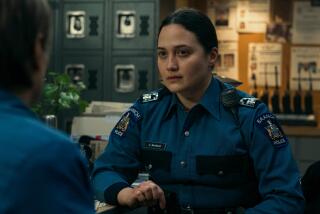Darkly Comic Japanese Fable Celebrates Goddess-Women
- Share via
Japanese master Shohei Imamura’s superb, darkly comic fable “Warm Water Under a Red Bridge” develops from a friendship between a Tokyo office worker (Koji Yakusho, of “Tampopo,” “Shall We Dance?” and Imamura’s “The Eel”) and an elderly man (Kazuo Kitamura) who lived in a book-lined shanty on a riverbank.
Yakusho’s Yosuke had been resigned to a dull, routine existence but has been laid off. Kitamura’s Taro, a free-spirited intellectual who had urged Yosuke to live life to the fullest, has just died, but not before telling his friend that long ago he had accidentally left a valuable gold Buddha in a flowerpot in an old house on the Noto Peninsula.
At loose ends and with his marriage disintegrating, Yosuke goes in search of the small statue. Sure enough, the house by the Red Bridge is still there, and from it emerges a pretty young woman (Misa Shimizu), whom Yosuke follows to a nearby supermarket.
As it happens, Shimizu’s Saeko is plagued by a physical disorder that appalls her but also incites her either to kleptomania or lust. Once they inevitably connect, they experience volcanic sex. (Like all Imamura films, this one is for mature audiences.)
Imamura is a vital, fearless filmmaker who tempers bleak, often satirical humor with compassion. His films possess an impassioned underlying protest of society’s destruction of the individual. Sometimes his outrage--and his outrageousness--gets the better of him, but he is invariably complex, provocative and unpredictable.
“Warm Water Under a Red Bridge,” based on a book by Yo Henmi, may well be Imamura’s funniest film; it is also one of his most accomplished. It is the work of a mature artist who has kept his adventurous spirit alive, which he has expressed in a complex and risky work carried off with an effortlessness that comes only from wisdom and experience.
Imamura has said he is drawn to strong women. The heroine of his “Pigs and Battleships” (1961), set near a U.S. naval base, is not destroyed by her rape by a GI. In “Intentions of Murder” (1964), a woman falls in love with her rapist and begins to question her duty to her lousy husband and his feudalistic family.
In this film, Imamura equates mankind and animals in their struggle for survival, as he did in “The Insect Woman” (1963), in which a simple country girl becomes a ruthless madam, ultimately devouring herself in her dedication to mother love and sacrifice.
In his 1983 remake of “The Ballad of Narayama” Imamura celebrates the strength of a peasant woman who calmly accepts an ancient village tradition in which its residents, upon reaching 70, are left to die on a snowy mountain. These films have allowed Imamura to probe profoundly the relationship of nature and society, to question the status of women and to celebrate their ultimate mystery and power.
This background informs every tantalizing frame of “Warm Water Under a Red Bridge,” at once earthy and surreal, as Saeko emerges as a mystical goddess of nature and Yosuke settles into the community, joining a robust crew of fishermen. Like Yosuke, we all but forget his search for the Buddha. When he receives a signal from Saeko, catching sunlight in a hand mirror, Yosuke comes running from the dock, often outstripping a runner training for the Olympics in his rush to slake Saeko’s desire.
As always, Imamura has a lot on his mind. In a black-and-white flashback that has the feel of one of his early films, we see the dire fate of Saeko’s mother in a turbulent sequence that recalls Imamura’s arguably greatest film, “The Profound Desire of the Gods” (1968), in which primitive beliefs collide with modern technology. Of “Warm Water,” Imamura has said that if the 21st century will be the era of science and technology, it will also be the era of women.
Beautiful, poetic, raw, violent, hilarious and unsetting, “Warm Water Under a Red Bridge” has been gloriously photographed and jauntily scored, and boasts a screen full of characters that range from the eloquent to the crude.
It ends on a note of the ambiguity that charges it throughout: Is Saeko a woman who is ultimately devouring or a woman merely in need of an understanding love or is she perhaps both--and a goddess as well? In any event, Imamura suggests that it’s worth the risk for Yosuke to find out.
*
Unrated. Times guidelines: complex adult themes, bizarre sexuality, nudity.
‘Warm Water Under a Red Bridge’
Koji Yakusho...Yosuke Sasano
Misa Shimizu...Saeko Aizawa
Kazuo Kitamura...Taro
Mitsuko Baisho...Mitsu Aizawa
A Cowboy Pictures release for Code Red of a Nikkatsu Production in association with Imamura Productions, BAP Inc., Eisei Gekijo and Maru Ltd. Director Shohei Imamura. Producer Hisa Iino. Executive producer Masaya Nakamura. Screenplay by Motofumi Tomikawa, Daisuke Tengan, Shohei Imamura; based on a book by Yo Henmi. Cinematographer Kamatsuhara Shigeru. Editor Hajime Okayasu. Music Shinichiro Ikebe. Production designer Hisao Inagaki. In Japanese, with English subtitles. Running time: 1 hour, 59 minutes.
Exclusively at the ArcLight, Sunset Boulevard and Vine Street, Hollywood, (323) 464-4226; UA Marketplace 6, 64 W. Colorado Blvd., Pasadena, (626) 444-FILM (No. 301); and University Town Center, 4245 Campus Drive, Irvine (949) 854-8811.
More to Read
Only good movies
Get the Indie Focus newsletter, Mark Olsen's weekly guide to the world of cinema.
You may occasionally receive promotional content from the Los Angeles Times.










